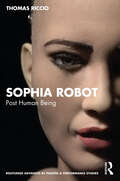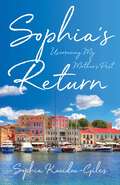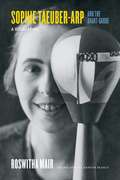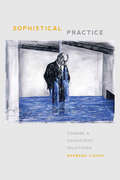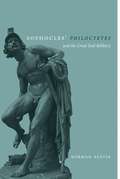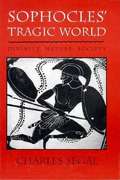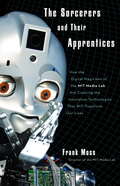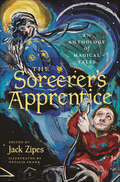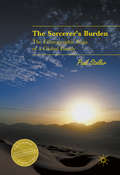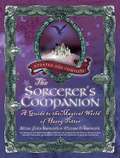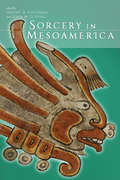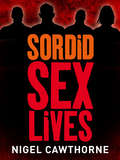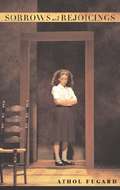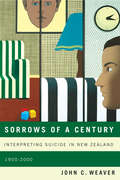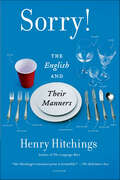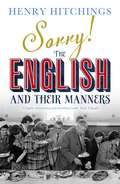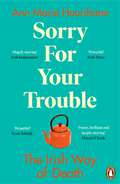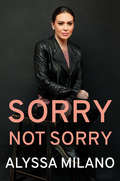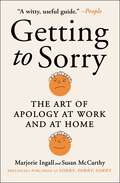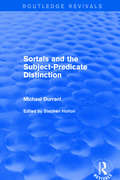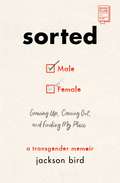- Table View
- List View
Sophia Robot: Post Human Being (ISSN)
by Thomas RiccioThis book considers David Hanson’s robots as a performative expression of our cultural moment, serving as a paradigm for the evolution of humanoid social robots.Mechanical beings have occupied the human imagination since antiquity. Now, they inhabit the pop-cultural imagination, embodying the apotheosis of humanity’s technological aspirations and dread. Sophia, Hanson’s most advanced robot, anticipates the future as she articulates the mythic pattern, narrative, anxieties, and hopes as old as humanity. Gendered as an attractive female with a face inspired by Queen Nefertiti and Audrey Hepburn, Sophia is a cipher, avatar, and turning point that brings humanity and technology a step closer to the emergence of a post-human species. The author is a transdisciplinary artist/scholar/educator working internationally in experimental performance, indigenous performance (ritual, shamanism), and social robotics. Hanson’s robots and Sophia are examined as performance media and events, as characters evolving as post-human narratives of technological beings. The emergent, complex, and collaborative relationships social robots have with technology, AI, performance, anthropology, mythology, psychology, sociology, popular culture, social media, politics, and economics are considered.
Sophia's Return: Uncovering My Mother's Past
by Sophia Kouidou-GilesAfter her parents&’ divorce, seven-year-old Sophia is raised by her paternal grandmother and, later, her father&’s second wife. She visits her mother on weekends until she finishes her high school, after which she moves to the US to complete her post-secondary studies and launch a career in child welfare. Decades later, Sophia travels back to Greece, determined to find her mother&’s grave and finally learn about the reasons for her parents&’ divorce. As she digs, she begins to realize how clashing cultures between her Greek-born mother and her father&’s early years in Turkey wreaked havoc on the marriage. Determined to unlock the true story, she interviews family members, all of whom are sympathetic but reluctant to disclose information. Finally, she hires an attorney and resorts to document searching—and uncovers a story she never knew existed. Written with illuminating insights and a mature understanding of what forced her mother&’s decision to abandon their home, Sophia&’s compassionate, authentic recounting of her journey will encourage those who search for the truth to persist in seeking answers to life&’s unanswered questions.
Sophie Taeuber-Arp and the Avant-Garde: A Biography
by Roswitha Mair Damion SearlsSophie Taeuber-Arp was a quiet innovator whose fame has too often been yoked to that of her husband, Jean Arp. Over time, however, she has slowly come to be seen as one of the foremost abstract artists and designers of the twentieth century. The Swiss-born Taeuber-Arp had a front row seat to the first wave of Dadaism and was, along with Mondrian and Malevich, a pioneer of Constructivism. Her singular artwork incorporated painting, sculpture, dance, fiber arts, and architecture, as hers was one of the first oeuvres to successfully bridge the divide between fine and functional art. Now Roswitha Mair has brought us the first biography of this unique polymath, illuminating not just Tauber-Arp’s own life and work, but also the various milieux and movements in which she traveled. No fan of the Dadaists and their legacy will want to miss this first English-language translation.
Sophistical Practice: Toward a Consistent Relativism
by Barbara CassinSophistics is the paradigm of a discourse that does things with words. It is not pure rhetoric, as Plato wants us to believe, but it provides an alternative to the philosophical mainstream. A sophistic history of philosophy questions the orthodox philosophical history of philosophy: that of ontology and truth in itself.In this book, we discover unusual Presocratics, wreaking havoc with the fetish of true and false. Their logoi perform politics and perform reality. Their sophistic practice can shed crucial light on contemporary events, such as the Truth and Reconciliation Commission in South Africa, where, to quote Desmond Tutu, “words,language, and rhetoric do things,” creating things like the new “rainbow people.” Transitional justice requires a consistent and sustainable relativism: not Truth, but truth for, and enough of the truth for there to be a community.Philosophy itself is about words before it is about concepts. Language manifests itself in reality only as multiplicity; different languages perform different types of worlds; and difficulties of translation are but symptoms of these differences. This desacralized untranslatability undermines and deconstructs the Heideggerian statement that there is a historical language of philosophy that is Greek by essence (being the only language able to say what “is”) and today is German.Sophistical Practice constitutes a major contribution to the debate among philosophical pluralism, unitarism, and pragmatism. It will change how we discuss such words as city, truth, and politics. Philologically and philosophically rethinking the sophistical gesture, relying on performance and translation, it proposes a newparadigm for the human sciences.
Sophocles' Philoctetes and the Great Soul Robbery
by Norman AustinNorman Austin brings both keen insight and a life-long engagement with his subject to this study of Sophocles' late tragedyPhiloctetes, a fifth-century BCE play adapted from an infamous incident during the Trojan War. InSophocles' "Philoctetes" and the Great Soul Robbery, Austin examines the rich layers of text as well as context, situating the play within the historical and political milieu of the eclipse of Athenian power. He presents a study at once of interest to the classical scholar and accessible to the general reader. Though the play, written near the end of Sophocles' career, is not as familiar to modern audiences as his Theban plays,Philoctetesgrapples with issues-social, psychological, and spiritual-that remain as much a part of our lives today as they were for their original Athenian audience.
Sophocles' Tragic World: Divinity, Nature, Society
by Charles SegalIn a series of engagingly written interconnected essays, Segal studies five of Sophocles' seven extant plays: Ajax, Oedipus Tyrannus, Philoctetes, Antigone, and the often neglected Trachinian Women.
The Sopranos
by Franco RicciOften hailed as one of the greatest television series of all time, The Sopranos is a product of its time, firmly embedded in the problems of post-industrial, post-ethnic America. In The Sopranos: Born under a Bad Sign, Franco Ricci examines the groundbreaking HBO series and its impact as a cultural phenomenon.Ricci demonstrates an encyclopedic knowledge of the series, the genre, and their social context in his analysis of the show's complex themes and characters. He explores The Sopranos' deep engagement with problems of race, class, gender, and identity, specifically in its portrayal of the Italian-American experience, consumer and media-driven society, and contemporary psychosocial issues. The series' protagonist, Mafia boss and patriarch Tony Soprano, in many ways embodies the anxieties of our age. Focusing on Tony's internal struggles and interactions with his therapist, family, and associates, Ricci traces this archetypal character's existential conflicts and sheds light on his search for self, connection, and meaning.Comprehensive in scope and sophisticated in approach, The Sopranos: Born under a Bad Sign is richly rewarding reading for anyone with an interest in the popular television drama, both as entertainment and social commentary.
The Sorcerers and Their Apprentices
by Frank MossIf you've ever read a book on an e-reader, unleashed your inner rock star playing Guitar Hero, built a robot with LEGO Mindstorms, or ridden in a vehicle with child-safe air bags, then you've experienced first hand just a few of the astounding innovations that have come out of the Media Lab over the past 25 years. But that's old hat for today's researchers, who are creating technologies that will have a much deeper impact on the quality of people's lives over the next quarter century. In this exhilarating tour of the Media Lab's inner sanctums, we'll meet the professors and their students - the Sorcerers and their Apprentices - and witness first hand the creative magic behind inventions such as: * Nexi, a mobile humanoid robot with such sophisticated social skills she can serve as a helpful and understanding companion for the sick and elderly. * CityCar, a foldable, stackable, electric vehicle of the future that will redefine personal transportation in cities and revolutionize urban life. * Sixth Sense, a compact wearable device that transforms any surface - wall, tabletop or even your hand - into a touch screen computer.* PowerFoot, a lifelike robotic prosthesis that enables amputees to walk as naturally as if it were a real biological limb. Through inspiring stories of people who are using Media Lab innovations to confront personal challenges - like a man with cerebral palsy who is unable to hum a tune or pick up an instrument yet is using an ingenious music composition system to unleash his "inner Mozart", and a woman with a rare life-threatening condition who co-invented a revolutionary web service that enables patients to participate in the search for their own cures - we'll see how the Media Lab is empowering us all with the tools to take control of our health, wealth, and happiness. Along the way, Moss reveals the highly unorthodox approach to creativity and invention that makes all this possible, explaining how the Media Lab cultivates an open and boundary-less environment where researchers from a broad array of disciplines - from musicians to neuroscientists to visual artists to computer engineers - have the freedom to follow their passions and take bold risks unthinkable elsewhere. The Sorcerers and Their Apprentices can serve as a blueprint for how to fix our broken innovation ecosystem and bring about the kind of radical change required to meet the challenges of the 21st century. It is a must-read for anyone striving to be more innovative as an individual, as a businessperson, or as a member of society. Also includes 16 pages of color photos highlighting some of the lab's most visually stunning inventions - and the people who make them possible. From the Hardcover edition.
The Sorcerer's Apprentice: An Anthology of Magical Tales
by Natalie FrankA diverse new anthology that traces the meaning and magic of the sorcerer's apprentice tale throughout history"The Sorcerer's Apprentice" might conjure up images of Mickey Mouse from the Disney film Fantasia, or of Harry Potter. As this anthology reveals, however, "sorcerer's apprentice" tales—in which a young person rebels against, or complies with, an authority who holds the keys to magical powers—have been told through the centuries, in many languages and cultures, from classical times to today. This unique and beautifully illustrated book brings together more than fifty sorcerer's apprentice stories by a plethora of writers, including Ovid, Sir Walter Scott, and the Brothers Grimm. From Goethe's "The Pupil in Magic" to A. K. Ramanujan's "The Guru and His Disciple," this expansive collection presents variations of a classic passed down through countries and eras.Readers enter worlds where household objects are brought to life and shape-shifting occurs from human to animal and back again. We meet two types of apprentice: "The Humiliated Apprentice," a foolish bumbler who wields magic ineffectively and promotes obedience to authority; and "The Rebellious Apprentice" who, through ambition and transformative skills, promotes empowerment and self-awareness. In an extensive introduction, esteemed fairy-tale scholar Jack Zipes discusses the significance and meaning of the apprentice stories, the contradictions in popular retellings, and the importance of magic as a tool of resistance against figures who abuse their authority. Twenty specially commissioned black-and-white illustrations by noted artist Natalie Frank bring the stories to visual life.The Sorcerer's Apprentice enlightens and entertains readers with enduring, spellbinding tales of sorcery that have been with us through the ages.
The Sorcerer's Burden
by Paul StollerThis book emerges from the author's 35 years of research and thought about the Songhay people of Niger. This ethnographic novel follows the life of Omar Dia, the oldest son of a West African sorcerer. When his father falls ill and dies, the great sorcerer vomits a small metal chain onto his chest. Following the path of his ancestors, Omar swallows the chain, becoming his father's successor, which means that he takes on the sorcerer's burden. The book also describes how custodians of traditional knowledge are creatively adapting to the forces of globalization--all in a highly accessible narrative text.
The Sorcerer's Companion: A Guide to the Magical World of Harry Potter, Third Edition
by Allan Zola Kronzek Elizabeth KronzekThe New York Times bestseller, now fully updated to include the complete seven-volume series.Who was the real Nicholas Flamel? How did the Sorcerer's Stone get its power? Did J. K. Rowling dream up the terrifying basilisk, the seductive veela, or the vicious grindylow? And if she didn't, who did?Millions of readers around the world have been enchanted by the magical world of wizardry, spells, and mythical beasts inhabited by Harry Potter and his friends. But what most readers don't know is that there is a centuries-old trove of true history, folklore, and mythology behind Harry's fantastic universe. Now, with The Sorcerer's Companion, those without access to the Hogwarts Library can school themselves in the fascinating reality behind J. K. Rowling's world of magic. Newly updated to include Harry Potter and the Half Blood Prince, and Harry Potter and the Deathly Hallows, The Sorcerer's Companion allows curious readers to look up anything magical from the Harry Potter books and discover a wealth of entertaining, unexpected information. Wands and wizards, boggarts and broomsticks, hippogriffs and herbology, all have astonishing histories rooted in legend, literature, or real-life events dating back hundreds or even thousands of years. Magic wands, like those sold in Rowling's Diagon Alley, were once fashioned by Druid sorcerers out of their sacred yew trees. Love potions were first concocted in ancient Greece and Egypt. And books of spells and curses were highly popular during the Middle Ages. From Amulets to Zombies, you'll also learn:* how to read tea leaves * where to find a basilisk today * how King Frederick II of Denmark financed a war with a unicorn horn * who the real Merlin was * how to safely harvest mandrake root * who wore the first invisibility cloak* how to get rid of a goblin * why owls were feared in the ancient world* what really lies beyond the Veil* the origins of our modern-day "bogeyman," and more. A spellbinding tour of Harry's captivating world, The Sorcerer's Companion is a must for every Potter aficionado's bookshelf.The Sorcerer's Companion has not been prepared, approved, or licensed by any person or entity that created, published, or produced the Harry Potter books or related properties.
Sorcerers of Dobu: The social anthropology of the Dobu Islanders of the Western Pacific
by R. F. FortuneEver since its first publication in 1932, Sorcerers of Dobu has been recognized as one of the great triumphs of anthropological research and interpretation in the field of ethnography. A rich source of information on primitive psychology, the book presents sociological analysis of the complex tribal organisation of the Dobuans. Originally published in 1932
Sorcery in Mesoamerica
by Jeremy D. Coltman John M. D. PohlApproaching sorcery as highly rational and rooted in significant social and cultural values, Sorcery in Mesoamerica examines and reconstructs the original indigenous logic behind it, analyzing manifestations from the Classic Maya to the ethnographic present. While the topic of sorcery and witchcraft in anthropology is well developed in other areas of the world, it has received little academic attention in Mexico and Central America until now. In each chapter, preeminent scholars of ritual and belief ask very different questions about what exactly sorcery is in Mesoamerica. Contributors consider linguistic and visual aspects of sorcery and witchcraft, such as the terminology in Aztec semantics and dictionaries of the Kaqchiquel and K’iche’ Maya. Others explore the practice of sorcery and witchcraft, including the incorporation by indigenous sorcerers in the Mexican highlands of European perspectives and practices into their belief system. Contributors also examine specific deities, entities, and phenomena, such as the pantheistic Nahua spirit entities called forth to assist healers and rain makers, the categorization of Classic Maya Wahy (“co-essence”) beings, the cult of the Aztec goddess Cihuacoatl, and the recurring relationship between female genitalia and the magical conjuring of a centipede throughout Mesoamerica. Placing the Mesoamerican people in a human context—as engaged in a rational and logical system of behavior—Sorcery inMesoamerica is the first comprehensive study of the subject and an invaluable resource for students and scholars of Mesoamerican culture and religion. Contributors: Lilián González Chévez, John F. Chuchiak IV, Jeremy D. Coltman, Roberto Martínez González, Oswaldo Chinchilla Mazariegos, Cecelia F. Klein, Timothy J. Knab, John Monaghan, Jesper Nielsen, John M. D. Pohl, Alan R. Sandstrom, Pamela Effrein Sandstrom, David Stuart
Sordid Sex Lives
by Nigel CawthorneWhat do the rich and famous really get up to behind closed doors? When does sexual passion become sordid perversion? Who are history's most shocking deviants and what are their sex secrets? The pages of this book reveal 45 shocking, scandalous--and often disturbing--stories of promiscuity and sexual perversion throughout the ages. Uncovered here are the orgies of Cleopatra and the incest of the Romans; the darkest fantasies of Michelangelo and the gross indecencies of the Marquis de Sade; as well as the insatiable desires of Rasputin, the degrading fetishes of Adolf Hitler, the unashamed exhibitionism of Tallulah Bankhead and the dirty thrills of Elvis Presley. Sordid Sex Lives offers an insight into the shocking practices in which so many famous men and women have participated in. What motivates these sexual desires? Were they ever considered "normal?" And what happened to those whose filthy secrets were found out? Bursting with real-life accounts, this is the most explicit and shocking account of the sex lives of history's most notorious characters.
Sorgen und wirtschaften: Zur Ökologie sozialer und ökonomischer Daseinsgestaltung
by Wolf Rainer WendtEin Buch zur Notwendigkeit, dass in der globalen Krise sorgend gewirtschaftet werden muss. In dieser Situation bedingen die Sorgen und das Wirtschaften einander. Der Zusammenhang, der beschrieben wird, ist ein vielseitiger und vielschichtiger. Er betrifft die soziale Versorgung, das staatliche Handeln und die Verantwortung von Unternehmen. Alle Akteure sind sorgend und wirtschaftend im ökologischen Rahmen beteiligt an einer Entwicklung, die vor Ort und global dem Leben zuträglich sein soll.
Sorrows and Rejoicings
by Athol Fugard"If there is a more urgent and indispensible playwright in world theatre than South Africa's Athol Fugard, I don't know who it could be."--Jack Kroll, NewsweekOne of the true contemporary masters of the stage, South African playwright Athol Fugard has written one of his most stunning works. Sorrows and Rejoicings explores the legacy of Apartheid on two women--one white, the other black--who on the surface seem to have little in common except for their love of one man, a white poet who is attached to the Karoo land of South Africa. The drama moves between past and present, reliving the poet's despondent years in exile and his eventual return to a new South Africa. With lyrical grace, Fugard once again demonstrates the human struggle to transcend the treacherous injustices of history.South African playwright, actor and director, Athol Fugard is one of the world's leading theatre artists, of whom The New Yorker has said, "A rare playwright, who could be a primary candidate for either the Nobel Prize on Literature or the Nobel Peace Prize."Also available by Athol Fugard: The Road to MeccaPB $11.95 0-930452-79-8 * USA My Children! My Africa!PB $10.95 1-55936-014-3 o USAStatementsPB $10.95 0-930452-61-5 * USA Blood Knot and Other PlaysPB $ 14.95 1-55936-020-8 * USA Valley SongPB $10.95 1-55936-119-0 * USA
Sorrows of a Century
by John WeaverIn Sorrows of a Century, John Weaver describes how personal relationships, work, poverty, war, illness, and legal troubles have driven thousands to despair. His study is set in twentieth-century New Zealand where - in spite of high standards of living and a commitment to social welfare - citizens have experienced the profound losses and stresses of the human condition. Focusing on New Zealand because it has the most comprehensive and accessible coroners' records, Weaver analyzes a staggering amount of information to determine the social and cultural factors that contribute to suicide rates. He examines the country's investigations into sudden deaths, places them within the context of major events and societal changes, and turns to witnesses' statements, suicide notes, and medical records to remark on prevention strategies. His extensive survey of twelve thousand cases also provides an insightful assessment of psychiatry and psychology in the last century. In reviewing the motives and methods of suicide, Weaver points out the complications facing deterrence. Moving beyond the timeless present of the social sciences and the irrationality emphasized in psychology, Sorrows of a Century marshals testimony to highlight the historical context and rational conduct behind suicide.
Sorrows of a Century: Interpreting Suicide in New Zealand, 1900-2000 (McGill-Queen's/Associated Medical Services Studies in the History of Medicine, Health, and Society #40)
by John C. WeaverIn Sorrows of a Century, John Weaver describes how personal relationships, work, poverty, war, illness, and legal troubles have driven thousands to despair. His study is set in twentieth-century New Zealand where - in spite of high standards of living and a commitment to social welfare - citizens have experienced the profound losses and stresses of the human condition. Focusing on New Zealand because it has the most comprehensive and accessible coroners' records, Weaver analyzes a staggering amount of information to determine the social and cultural factors that contribute to suicide rates. He examines the country's investigations into sudden deaths, places them within the context of major events and societal changes, and turns to witnesses' statements, suicide notes, and medical records to remark on prevention strategies. His extensive survey of twelve thousand cases also provides an insightful assessment of psychiatry and psychology in the last century. In reviewing the motives and methods of suicide, Weaver points out the complications facing deterrence. Moving beyond the timeless present of the social sciences and the irrationality emphasized in psychology, Sorrows of a Century marshals testimony to highlight the historical context and rational conduct behind suicide.
Sorry!: The English and Their Manners
by Henry HitchingsA humorous and charming investigation into what it really means to have proper mannersMost of us know a bit about what passes for good manners—holding doors open, sending thank-you notes, no elbows on the table—and we certainly know bad manners when we see them. But where has this patchwork of beliefs and behaviors come from? How did manners develop? How do they change? And why do they matter so much? In examining English manners, Henry Hitchings delves into the English character and investigates what it means to be English.Sorry! presents an amusing, illuminating, and quirky audit of British manners. From basic table manners to appropriate sexual conduct, via hospitality, chivalry, faux pas, and online etiquette, Hitchings traces the history of England's customs and courtesies. Putting some of the most astute observers of humanity—including Jane Austen and Samuel Pepys—under the microscope, he uses their lives and writings to pry open the often downright peculiar secrets of the English character. Hitchings's blend of history, anthropology, and personal journey helps us understand the bizarre and contested cultural baggage that goes along with our understanding of what it means to have good manners.
Sorry! The English and Their Manners: The English And Their Manners
by Henry HitchingsMost of us know a bit about what passes for good manners - holding doors open, sending thank-you notes, no elbows on the table. We certainly know bad manners when we see them. But where has this patchwork of beliefs and behaviours come from? How did manners develop? How do they change? And why do they matter so much to us? In examining our manners, Henry Hitchings delves into the English character and investigates our notions of Englishness. Sorry! presents an amusing, illuminating and quirky audit of English manners. From basic table manners to appropriate sexual conduct, via hospitality, chivalry, faux pas and online etiquette, Hitchings traces the history of our country's customs and courtesies.Putting under the microscope some of our most astute observers of humanity, including Jane Austen and Samuel Pepys, he uses their lives and writings to pry open the often downright peculiar secrets of the English character. Hitchings' blend of history, anthropology and personal journey helps us understand our bizarre and contested cultural baggage - and ourselves.
Sorry for Your Trouble: The Irish Way of Death
by Ann Marie HourihaneThe Irish do death differently.Funeral attendance is a solemn duty - but it can also be a big day out, requiring sophisticated crowd control, creative parking solutions and a high-end sound system. Despite having the same basic end-of-life infrastructure as other Western countries, Irish culture handles death with a unique blend of dignified ritual and warm sociability.In Sorry for Your Trouble, Ann Marie Hourihane holds up a mirror to the Irish way of death: the funny bits, the sad bits, and the hard-to-explain bits that tell us so much about who we are. She follows the last weeks of a woman's life in hospice; she witnesses an embalming; she attends inquests; she talks to people working to prevent suicide; she follows the team of specialists working to locate the remains of people 'disappeared' by the IRA; and she visits some of Ireland's most contested graves. She also explores the strange and sometimes surprising histories of Irish death practices, from the traditional wake and ritual lamentations to the busy commerce between anatomists and bodysnatchers. And she goes to funerals, of ordinary and extraordinary people all over the country - including that of her own father. 'I had joined a club,' she writes, 'the club of people who have lost someone very close to them.' And then, with her family, she sets about planning a funeral in the middle of a pandemic.Sorry for Your Trouble sheds fresh, wise and witty light on a key pillar of Irish culture: a vast but strangely underexplored subject. Rich, sparkling and eye-opening, it is one of the best books ever written about Irish life.___________________________'A beautiful, insightful reflection on a very, very peculiar country's approach to the oddest experience of them all' RYAN TUBRIDY'Hugely moving and illuminating. All of life, somehow, is here' TANYA SWEENEY, IRISH INDEPENDENT'Moving, comforting and funny' BUSINESS POST
Sorry Not Sorry
by Alyssa MilanoAlyssa Milano&’s sharply observed, uproarious, and deeply intimate ode to the life she has lived and the issues that matter most. Alyssa Milano, actress and activist, delivers here a collection of powerful personal essays that get to the heart of her life, career, and all-out humanitarianism. These essays are unvarnished and elegant, funny and heartbreaking, and utterly real. A timely book that shows in almost real time the importance of taking care of others, it also gives a gut-punch-level wake-up call in an era where the noise is a distraction from what really needs to happen, if we want to live in a better world. These are stories of growing up in celebrity, of family and of friends, of connections and breaking apart. They have teeth on the page and come from the heart. And they are stories that offer a direct line into the thoughts and life of one of the most visible, hard-working humanitarians we have. A bestselling children's book author, Alyssa's finally giving her fans worldwide what they really want to hear directly from her about: the life she has lived, the things she's seen and experienced, and the way she lives in and with the world.
Sorry, Sorry, Sorry: The Case for Good Apologies
by Marjorie Ingall Susan McCarthy&“I&’m sorry, but Sorry, Sorry, Sorry means that you no longer have an excuse for delivering anything other than a pitch-perfect apology. Ingall and McCarthy break down thorny questions…with grace and humor.&” —Peggy Orenstein, bestselling author of Boys & Sex, Girls & Sex, and Cinderella Ate My DaughterIt&’s a truth universally acknowledged that terrible apologies are the worst. We&’ve all been on the receiving end, and oh, how they make us seethe. Horrible public apologies—excuse-laden, victim blame-y, weaselly statements—often go viral instantaneously, whether they&’re from a celebrity, a politician, or a blogger. We all recognize bad apologies when we hear them. So why is it so hard to apologize well? How can we do better? How could they do better? Marjorie Ingall and Susan McCarthy show us the way. Drawing on a deep well of research in psychology, sociology, law, and medicine, they explain why a good apology is hard to find and why it doesn&’t have to be. Alongside their six (and a half)-step formula for apologizing beautifully, Ingall and McCarthy also delve into how to respond to a bad apology; why corporations, celebrities, and governments seldom apologize well; how to teach children to apologize; how gender and race affect both apologies and forgiveness; and most of all, why good apologies are essential, powerful, and restorative. A good apology can do so many things—mend fences, heal wounds, and bring more harmony into ourselves and our society at large. With wit, deep introspection, and laugh-out-loud humor, Ingall and McCarthy&’s guidance will help make the world a better place, one apology at a time.
Sortals and the Subject-predicate Distinction (2001)
by Michael DurrantThis title was first published in 2001. The problem of the subject-predicate distinction has featured centrally in much of modern philosophy of language and philosophical logic, and the distinction is taken as basic or fundamental in modern philosophical logic. Michael Durrant seeks to demonstrate that the distinction should not be taken as basic or fundamental and argues that the reason for it being held to be fundamental is a failure to acknowledge the category and role of the sortal. A sortal is a symbol which furnishes us with a principle for distinguishing and counting particulars (objects) and whick does so in its own right relying on no antecedent principle or method of so distinguishing or counting. This book explores sortals and their relationship to the subject-predicate distinction; arguing that the nature of sortal symbols has been misconstrued in much modern writing in the philosophy of logic by failing to distinguish sortals from names and predicates.
Sorted: Growing Up, Coming Out, and Finding My Place (A Transgender Memoir)
by Jackson BirdAn unflinching and endearing memoir from LGBTQ+ advocate Jackson Bird about how, through a childhood of gender mishaps and an awkward adolescence, he finally sorted things out and came out as a transgender man in his mid-twenties. When Jackson Bird was twenty-five, he came out as transgender to his friends, family, and anyone in the world with an Internet connection. Assigned female at birth and having been raised a girl, he often wondered if he should have been born a boy. Jackson didn’t share this thought with anyone because he didn’t think he could share it with anyone. Growing up in Texas in the 1990s, he had no transgender role models. He barely remembers meeting anyone who was openly gay, let alone being taught that transgender people existed outside of punchlines. Today, Jackson is a writer, YouTuber, and LGBTQ+ advocate living openly and happily as a transgender man. So how did he get here? In this remarkable, educational, and uplifting memoir, Jackson chronicles the ups and downs of growing up gender confused. Illuminated by journal entries spanning childhood to adolescence to today, he candidly recalls the challenges he faced while trying to sort out his gender and sexuality, and worrying about how to interact with the world. With warmth and wit, Jackson also recounts how he navigated the many obstacles and quirks of his transition––like figuring out how to have a chest binder delivered to his NYU dorm room and having an emotional breakdown at a Harry Potter fan convention. From his first shot of testosterone to his eventual top surgery, Jackson lets you in on every part of his journey—taking the time to explain trans terminology and little-known facts about gender and identity along the way. Through his captivating prose, Bird not only sheds light on the many facets of a transgender life, but also demonstrates the power and beauty in being yourself, even when you’re not sure who “yourself” is. Part memoir, part educational guide, Sorted is a frank, humorous narrative of growing up with some unintended baggage.
